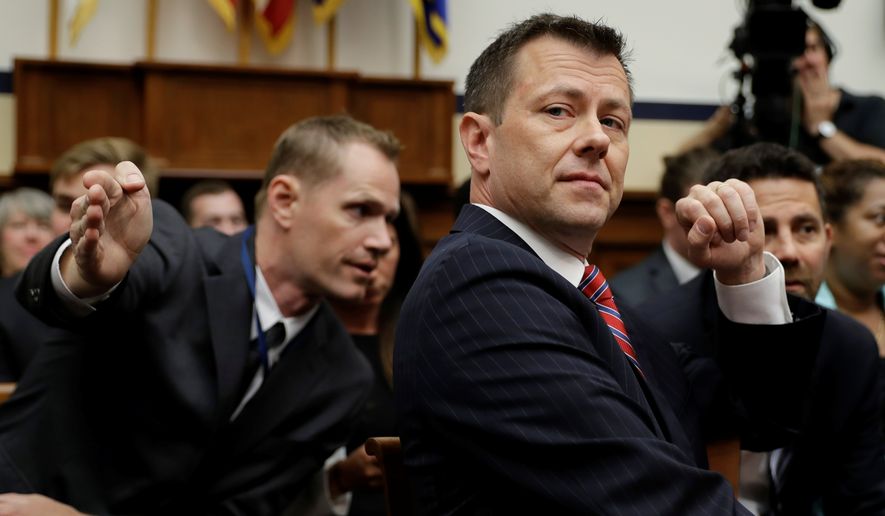OPINION:
The latest string of text messages between disgraced FBI agent Peter Strzok and his in-house paramour Lisa Page appear to show a concerted strategy to leak secret information to The Washington Post and The New York Times.
The text messages detailed in a letter from Rep. Mark Meadows, North Carolina Republican, to Deputy Attorney General Rod Rosenstein paint a damning picture of media manipulation in April 2017, just weeks before FBI Director James Comey was fired by President Trump.
“I had literally just gone to find this phone to tell you I want to talk to you about media leak strategy with DOJ before you go,” Mr. Strzok texted Ms. Page on April 10, according to Mr. Meadows, quoting text messages recently released by the Justice Department after nearly a year of intragovernment wrangling between congressional Republicans and the DOJ.
Two days later, Mr. Strzok alerted Ms. Page that two articles would be coming out about Ms. Page’s “namesake,” one that would be worse than the other. Ms. Page’s “namesake,” it is reasonable to conclude, is Naval Academy graduate and retired Navy intelligence officer Carter Page, who had been under secret FISA surveillance since October 2016.
“Also, apparently Times is angry with us about the [Washington Post] scoop and earlier discussion we had about the Schmidt piece that had so many inaccuracies. Too much to detail here, but I told Mike (redacted) and Andy they need to understand we were absolutely dealing in good faith with them,” Mr. Strzok texted to Ms. Page on April 14, 2017. “The FISA one, coupled with the Guardian piece from yesterday.”
“Article is out! Well done, Page,” Mr. Strzok wrote to Ms. Page on April 22, suggesting that she may have helped facilitate the article.
Over the course of the days of these texts, a series of articles detailed the ultrasecret FISA warrant information about Mr. Page, claiming that the FBI had concrete evidence that the former Trump campaign volunteer was acting as an agent of a foreign government, Vladimir Putin’s Russia.
At the White House, meanwhile, an increasingly frustrated Mr. Trump was being assured by Mr. Comey that the president was not under investigation.
However, Mr. Comey and his team at the FBI couldn’t figure out a “media leak strategy” to get that story out. The only leaks Mr. Comey’s dream team could come up with, apparently, were illegal ones suggesting that Russians had infiltrated the newly inaugurated president’s campaign and maybe even his White House.
This is a deceitful and sordid story with potential crimes of obstruction of justice, abuse of power and, at the very least, illegal release of state secrets related to national security.
But Ms. Strzok and Mr. Page’s media leak strategy was able to work only if they had partners at The Washington Post and The New York Times. The leaks fed a ravenous beast in those papers’ newsrooms, which were hungry to damage the new president and vindicate their chosen candidate, Hillary Clinton.
The problem for them is, they had to know the Carter Page story was crap.
Let’s not forget, the FISA warrant on Mr. Page would not have been obtained without the use of the Clinton-financed opposition research documents known as the Russian dossier — a handful of unverified and salacious memos compiled by a British former spy named Christopher Steele.
Mr. Steele and his client, Fusion GPS honcho Glenn Simpson, peddled the dossier to multiple media outlets in the late summer and early fall 2016 hoping for an October surprise that would finally end the Trump campaign. But other than Michael Isikoff at Yahoo News and David Corn at Mother Jones, journalists wouldn’t bite. They knew the dossier was trash.
So when they got the leaks from their sources at DOJ about the FISA warrant, they had to know that the entire tale was based on the bogus dossier. But they ran with the story anyway because it drove the narrative they wanted to drive.
Just like the “echo chamber” that Ben Rhodes bragged about when the media helped drive the Obama administrations narrative on the disastrous Iran nuclear deal, journalists took their leaks and published stories at the beck and call of corrupt government toadies.
As the whole “Russia probe” drama unfolds little by little, bear in mind that while much of the scandal envelops the FBI and DOJ over their misconduct during the 2016 election (in their mishandling of the Clinton email case as well as their surveillance of the Trump campaign), the mainstream media is very much a part of the scandal.
You can’t have a “media leak strategy” without plenty of willing accomplices in the media.
⦁ Larry O’Connor writes about politics and the media for The Washington Times and can be heard weekday afternoons on WMAL radio in Washington. Follow Larry on Twitter @LarryOConnor.
• Larry O'Connor can be reached at loconnor@washingtontimes.com.




Please read our comment policy before commenting.